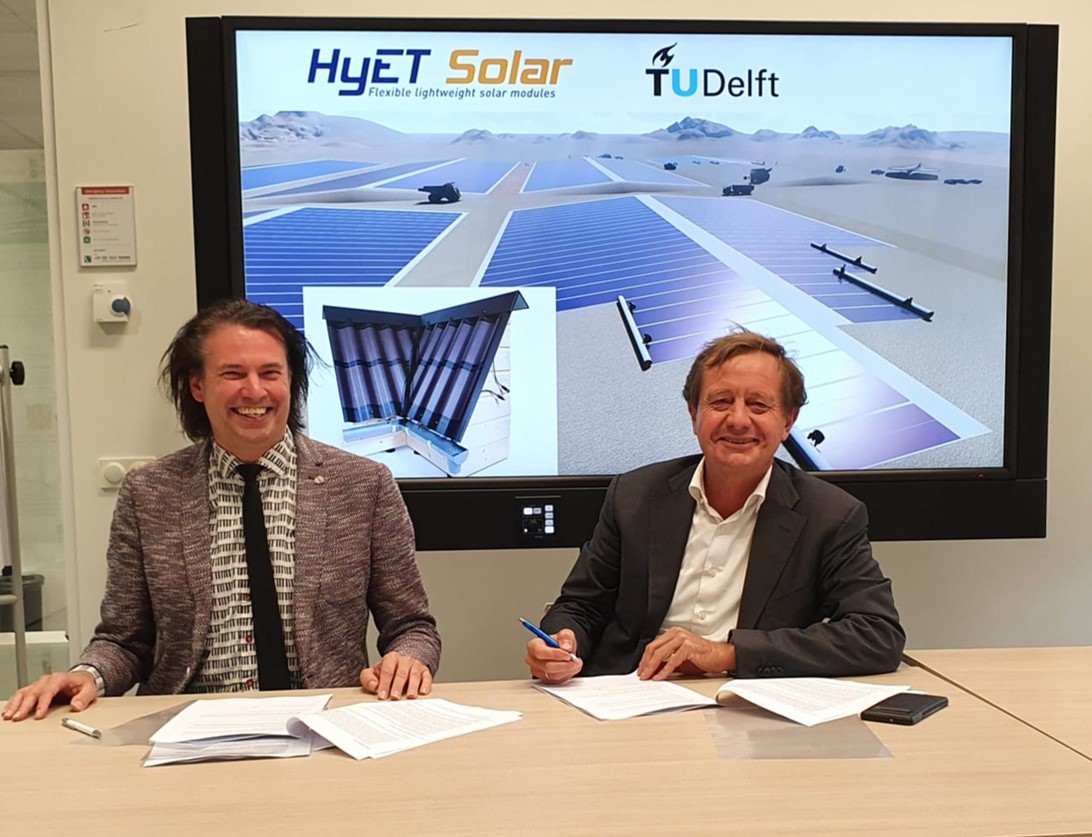TU Delft and HyET Solar strengthen their partnership – in lightweight, flexible and ubiquitous thin-film solar foil
Solar foil represents the future. It can be applied in countless and unique ways – all the way from integrating it into traditional roof tiles through to creating new large-scale solar parks that reduce the price of our electricity. By signing a new four-year research contract, TU Delft and HyET Solar have sped up the introduction of the next generation of solar foil, bringing this vision of the future a significant step closer.
Any shape or size
The properties of Powerfoil® (the lightweight, flexible, thin-film silicon PV technology) open up new markets for solar energy that cannot be served by existing inflexible and heavy glass panels. Powerfoil can be made in any shape or size. For example, its roll-to-roll production process allows up to 30-metre long modules to be produced, while the shape can be adapted to the needs of the end user. A new production facility is going to be built in Arnhem, which will make the development of all these innovative Powerfoil features of a reality – with a capacity of 40 MW/year.
Fundamental research with an industrial approach
TU Delft's research activities are headed by Professor Arno Smets. For many years, Smets has researched technologies that can convert solar energy into usable energy, such as electrical or chemical energy. In 2009, he received a Vidi for his research into the use of thin layers of silicon to increase solar panel efficiency. In the years that followed, the solar expert created an international furore with online lectures on solar energy (which can be followed via the international platform edX). In 2019, at an international summit in Canada, Smets was named Mission Innovation Champion – an important pioneering role in the field of clean energy.
Smets: ‘This collaboration with HyET Solar is a great example of how lab-scale innovation can be quickly converted to industrial-scale manufacturing. New materials, device architectures and processing steps developed in our university lab will soon be applied in current and future production lines at HyET Solar. I am delighted that our expertise, research activities and students are having a direct impact on one of the most exciting developments in solar power technologies in the world today.’
Edward Hamers, Head of Technology at HyET Solar: ‘It is an honour to work with one of the most renowned institutes in the field of photovoltaic technology. This allows us to take our unique production to the next level. The university’s fundamental research fits seamlessly with our industrial approach, and that’s what makes the cooperation so successful. It’s been made possible in recent years thanks to support from various Dutch funding programmes. With the current expansion of our production facility in Arnhem, we can finally produce this Dutch technology on a large scale and thus tap completely new markets that are out of reach for conventional PV modules.’
World improvers
Smet emphasised that cooperation is not only an important step forward in the field of research: it also touches a personal chord with him. ‘I am inspired every day by the young people we educate – young people who want to improve the world with our knowledge. The great thing about our cooperation with HyET Solar is that the distance between learning, working and innovating becomes even smaller. Scientific innovations and workplace learning go hand in hand. We create learning communities that support students, researchers and professionals as they develop their engineering and innovation skills.’
Accelerating the energy transition
It should come as no surprise that many scenarios around speeding up the energy transition predict an important role for solar energy, but also specify all kinds of preconditions that have to be met. An integral approach is the key, according to Smets. By this, he means that all stakeholders must take responsibility to realise a smooth energy transition. He said that the intensification of cooperation with HyET Solar is a good example of this: ‘It is extra cool that our cooperation has been given this enormous boost in TU Delft’s anniversary year. The university is celebrating its 180th Dies Natalis, with “speeding up the energy transition” as its theme. The energy transition we need can only succeed through collaboration within and outside the scientific community, and by joining forces with industry, governments, alumni and all other stakeholders.’
More information
For questions, please contact:
- Dave Boomkens, TU Delft science officer - D.J.Boomkens@tudelft.nl / 06 34081461
- Arno Smets, Professor of Photovoltaic Materials and Devices, A.H.M.Smets@tudelft.nl


